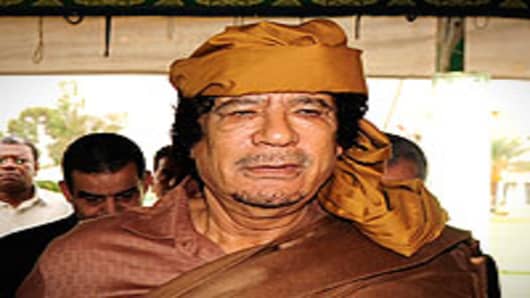Those reserves, among the top 25 in the world, are worth more than $6.5 billion at current prices, enough to pay a small army of mercenaries for months or even years.
While many central banks hold their gold reserves in international vaults in London, New York or Switzerland, Libya’s bullion is in the country, said people familiar with the country’s activities in the gold market.
US and European governments have frozen billions of dollars in Libyan assets, as sanctions have hit the central bank, sovereign wealth fund and state oil company.
But Libya’s gold reserves may provide Col Gaddafi with a lifeline—if he can sell them. To raise large amounts of money, bankers said, Col Gaddafi would have to transport the bullion out of Libya.
Before violence broke out the gold was stored at the central bank in Tripoli. But since then it may have been moved to another location, such as the southern city of Sebha—within reach of the borders with Chad and Niger.
The political turbulence in the Middle East—besides boosting the price of goldto a record $1,444 a troy ounce—has highlighted the property that has for centuries made gold so appealing to criminals, investors and dictators alike: it does not rely on a government for its value.
Following the revolution in Egypt, the country banned gold exports for four months in order to prevent officials of the former government from moving their wealth abroad.
At the same time, Iran has been quietly stocking up on goldin recent years, in an apparent attempt to shift away from the US dollar and thus protect its reserves from risk of seizure. Other significant buyers of gold include China, Russia and India.
No international bank or trading house is likely to buy gold with any hint of a link to the Libyan regime, bankers said. “Physical trading houses are now quite reluctant to deal with countries that have been involved with conflict—they don’t know who’s on the end of the trade,” said one banker.
But Col Gaddafi could transport the gold to Chad or Niger, where the gold could be swapped for currency transferred into a bank owned by the Libyan Foreign Bank—a branch of the central bank.
“If a country like Libya wants to make their gold liquid it would probably be in the form of a swap—whether for arms, food or cash,” said Walter de Wet, head of commodities research at Standard Bank.
In addition to the gold reserves, Col Gaddafi may also have hoarded some cash from oil sales outside of the traditional channels.


